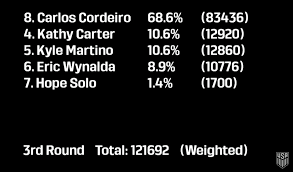By Paul Nicholson
February 12 – It took three rounds of voting before Carlos Cordeiro emerged triumphant in the ballot for the US Soccer Federation presidency. Cordeiro, who has been the US federation’s vice president for the last two years and an independent board member for nine years, fought off eight challengers for the post in what proved to be a canny campaign that appealed to the broader base of US soccer’s community.
Cordeiro, a former Goldman Sachs investment banker, immediately promised that he would bring unity to the federation saying: “To those of you who didn’t vote for me, I’m going to work to earn your support and trust over the next four years. I promise I will work for all of you to bring us together as one soccer community.”
He also promised there would be a different management style after 12 years of rule by outgoing president Sunil Gulati. “My campaign was all about being more collaborative, inclusive, working on teams…You will see a very different leadership going forward,” he said.
Cordeiro has long been Gulati’s wing man, but that relationship soured when Cordeiro announced his candidacy before Gulati had decided he wasn’t going to run again. Gulati could be perceived as being the fall guy for the US’s spectacular failure to qualify for the Russia 2018 World Cup, but that would be an over-simplification of US soccer.
Cordeiro was up against opponents who represented different viewpoints within the US game. Former men’s national team players Eric Wynalda, Kyle Martino and Paul Caligiuri and ex-women’s national team goalkeeper Hope Solo were very much based around the importance of development of talent pyramids for the international teams.
Lawyers Steve Gans and Michael Winograd offered an interesting alternative crossing governance, grassroots development and business practicality, while Kathy Carter, though grounded in the playing of the game, was nevertheless the ‘commercial’ side of the business’ favourite via her role as chief executive of Soccer United Marketing (SUM), the MLS and USSF’s cornerstone commercial representative.
Carter was the pre-election favourite having the powerful backing of the the professional game that made up and Gulati. They underestimated the canniness of Cordeiro’s electioneering and his willingness to travel the country visiting all the stakeholders personally.
Before Christmas Kevin Payne, CEO of the influential US Club Soccer youth organisation, told Insideworldfootball that the core voting constituency were ultimately less concerned about the national team and World Cup qualification, and more focussed on who would bring stability to the grassroots and club structures – many felt they had been neglected and penalised by development decisions taken under the Gulati regime.
That became clear by the second ballot that saw Cordeiro pull clear securing 41.8% of the vote to Carter’s 33.3%. In the third ballot Cordeiro emerged as a clear winner with 68.6% and Carter and Martino ending on 10.6% in joint second. Wynalda and Solo received 8.9% and 1.4% respectively.
Cordeiro’s presidency will inevitably be different in remit to Gulati’s in that he will not be making the decisions on the running of the men’s and women’s national teams in isolation, those roles will be lead by two new general managers. Cordeiro wouldn’t have it any other way as he does not pretend to be an expert in the playing of the game.
A member of the current US Soccer establishment, he managed to convince a disaffected but somewhat conservative membership that he was the person to bring reform across the federation. He was, ultimately, a vote for change. His first job will be unification and that will require a lot more of the persuasiveness he demonstrated to win this election.
Contact the writer of this story at moc.l1745189509labto1745189509ofdlr1745189509owedi1745189509sni@n1745189509osloh1745189509cin.l1745189509uap1745189509

